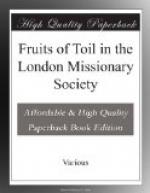Shall the children of the world, in these matters, be wise in their generation, and the children of light not go and do likewise? It is the universal conviction of residents in India that it is a wise course not to denationalize its inhabitants, but to keep them a distinct people; merely introducing into their dress and style of living those improvements which are demanded by health or by propriety. To make them Europeans is almost certain to do them irreparable injury. Adaptation is the law of life. Europeans, wherever they go, adapt their houses, their dress, their habits, and their food to the climate under which they live. However strong may be the belief of Englishmen in the excellence of our constitutional government, yet in all our colonies and dependencies the form adopted is one suitable to the knowledge, the power, the training, the degree of self-government attained by the people of that particular place. In no case do the English rulers force upon a dependency a system of government unsuitable to it, however excellent that system may in itself be.
[Illustration: Temples of Siva.]
So ought missionaries and Missionary Societies to act in building up native churches in foreign lands. Nowhere ought we to import and force upon them those systems of church government which amongst ourselves have been largely shaped out by political struggles, by numerous controversies, by local experience, and by the far reaching thoughts of a few great minds. In most cases we are ourselves outgrowing them. In striking instances these systems in Europe are found in certain of their elements to trammel and to cramp the life, the energy, the lofty aspirations of spiritual minds. And among the great problems now before us for the edification and extension of our modern churches, are not all thoughtful men anxious to see how in every case they may be made more elastic, more perfectly adapted in their organization, as well as in their plans of benevolence, to the demands of the present day; and specially how they may be so widened as to draw into the church in largest degree the piety, the experience, the zeal of the lay members of which our churches are chiefly composed?
[Illustration: Mrs. CORBOLD’S girls’ school, Madras.]
Why should we put upon the neck of our young disciples a yoke which we and our fathers have not been able to bear? We must teach them some system, and missionaries of different churches will naturally, as well as from conscientious principles, teach their own. But let us teach the systems in their essential elements; let us teach those elements which have stood the test of time, and are found suitable to the spiritual power, the self-management, the general resources, the christian civilization of the churches which we are asked to guide. We may well separate the theory and the principles of our different churches from the churches themselves as shaped out by history and by the conditions and the course of our own national life. Then will their real worth and excellence be more truly manifested, to the honour of God and the edification of His children. Let us not only open our alabaster box, let us also be willing to break it, if only the perfume of the Divine ointment may fill the house of God, and cheer and refresh the weary souls within its walls.




